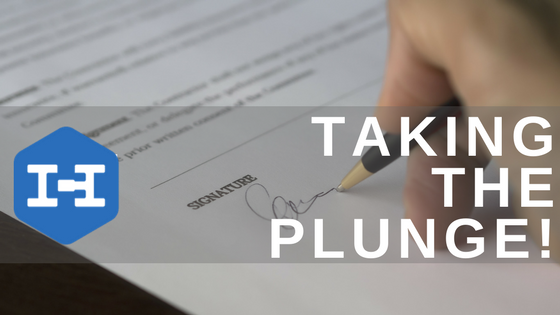Taking the Plunge
So, you’ve decided to be your own boss. Congratulations – seriously.
People become self-employed at different stages in life, for different reasons. Some people are born entrepreneurs, who can’t imagine how terrible it would be to have a boss. For them, it’s all about the hustle, the deal and the excitement.
Others are approaching their mature years and are looking for a change. If they’re retired or retiring from their former career, they’re really looking for something to keep them on their toes, out of the house, and to bring in some money. In these cases, it’s “business as a paying hobby”.
The busy majority
The majority are people who have served their time in the trenches of their chosen field, gained experience and credibility, and decided it’s time to do this for themselves, rather than somebody else.
There are many reasons to make this switch. On the up side, there’s the opportunity to pursue your dreams, to make more money, and have greater flexibility. But you may quit your day-job because you can see no progression, you’re fed up with office politics, your boss is a jerk….
This has to be a careful decision because you still have to feed your family. So here are some thoughts we’ve gathered over years of working with entrepreneurs and self-employed people. We hope they’re helpful. Enjoy!
Making more money
Let’s be clear: You may make oodles of money. Or you may make none at all – or even lose money. There is no guarantee. I know self-employed multi-millionaires, self-employed bankrupts, and lots of people in between. Some people are wonderful at what they do – and disastrous at making a living out it. The most financially successful aren’t necessarily the best at their actual “skill”.
A rough rule of thumb:
- If you’re good at what you do, and avoid silly mistakes, you should be able to make at least a respectable living.
- But if you left a regular paycheque to start something from scratch, expect a few years of lower income than what you’re used to, as you build your business. [See lesson 4 in ‘fast growing…’ blog post]
- Once your income has caught up, you have to catch up to where your savings would have been. It might take some years. After that, it’s all extra.
The flexible lifestyle
| On the one hand… | On the other hand…. |
|
|
Things you never realized your boss did for you
You may be doing exactly the same sort of work before and after you take the plunge. But be aware you might get sidetracked from actually trying to make money.. After all, now you are responsible for:
- Keeping on top of everything. As the business owner, you have to make sure the payments go out, the office is cleaned, the insurance is renewed, the marketing materials are printed the right colour. If you don’t want to do it yourself, you either have to do without, or pay somebody to do it for you. And then you’ve got to keep on top of somebody else.
- Paying for things you never really thought about before. For example, paid time off for vacations; CPP contributions; health or dental benefits. Again, you either have to fund these things yourself, or do without.
- Takes care of (most of) your taxes for you. OK, I assume you’ve always filed a tax return. But as an employee, you likely didn’t owe much – or had a refund – because your employer had sent money to the government for you each month. Guess who has to do that now? And – because of the volatility in your business income – you probably have no idea how much your taxes will be, until you have to file. On the plus side, you get to write off more stuff. [learn more “Write off or wrong”]
- Takes care of the books. Yawn, boring. But… before, you never had to worry about how whether or not the business was making money, because you were paid either way. Or things like filing HST returns. Trust me, this will change. And…. how you handle this can make a huge difference to your stress level and the quality of your business decisions. [This is a blatant plug for ScaleUP – see above!]
Given all that, don’t assume your working day now will look like it did when you worked for somebody else. You could be pulled in any of a million directions. Some people find that easier to deal with than others.
A few other thoughts:
Some people are “self-employed” because their employer has basically told them they have to be. They’re sitting in the same chair and doing the same thing, just now as a contractor. Some things to beware of in this situation. Call to discuss.
- Many people start as a proprietorship. Others incorporate straight away. Many incorporate after a couple of years. Will cover this in next blog post.
- There’s a big difference between being self-employed and owning a business. For the most part, being self-employed means making a living by selling your time, and you have relatively few costs. Owning a business typically means you are selling stuff or other people’s time. The financials can be much more complicated to track and manage, and you’re also now responsible for keeping your staff happy, busy and paid. On the other hand, you may well make more money, and have something to sell at the end of it all.
Finally….
Ultimately, I don’t know many people who become self-employed and regret it later. But it helps to know what you’re getting into. Hope this hasn’t put you off!

